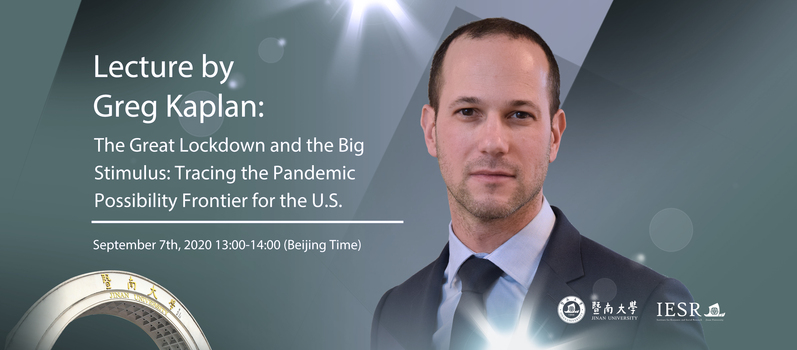Title:The Great Lockdown and the Big Stimulus: Tracing the Pandemic Possibility Frontier for the U.S.
Speaker: Greg Kaplan, University of Chicago
Time:September 7th, 2020 13:00-14:00 (Beijing Time)
Venue: Zoom

About the speaker:
Greg Kaplan is a Professor of Economics at the University of Chicago. His research spans macroeconomics, labor economics and applied microeconomics, with a focus on the distributional consequences of economic policies and economic forces. He has published extensively on the topics of inequality, risk sharing, unemployment, household formation, migration, fiscal policy and monetary policy. Greg is an Editor at the Journal of Political Economy, a Research Associate at the National Bureau of Economic Research and a Research Fellow at the Institute for Fiscal Studies. He is also an Economic Consultant at the Federal Reserve Bank of Chicago. Greg received a PhD from New York University in 2009, an MSc from the London School of Economics in 2002 and a BCom (Hons) from Macquarie University in 2000. In 2015 he received a Sloan Foundation fellowship and in 2019 he was awarded the Central Banking Prize for Economics in Central Banking for his paper Monetary Policy According to HANK, joint with Ben Moll and Gianluca Violante.
Abstract:
We provide a quantitative analysis of the trade-offs between health outcomes and the distribution of economic outcomes associated with alternative policy responses to the COVID-19 pandemic. We integrate an expanded SIR model of virus spread into a macroeconomic model with realistic income and wealth inequality, as well as occupational and sectoral heterogeneity. In the model, as in the data, economic exposure to the pandemic is strongly correlated with financial vulnerability, leading to very uneven economic losses across the population. We summarize our findings through a distributional pandemic possibility frontier, which shows the distribution of economic welfare costs associated with the different aggregate mortality rates arising under alternative containment and fiscal strategies. For all combinations of health and economic policies we consider, the economic welfare costs of the pandemic are large and heterogeneous. Thus, the choice governments face when designing policy is not just between lives and livelihoods, as is often emphasized, but also over who should bear the burden of the economic costs. We offer a quantitative framework to evaluate both trade-offs.
Please scan the code to register for the lecture:



